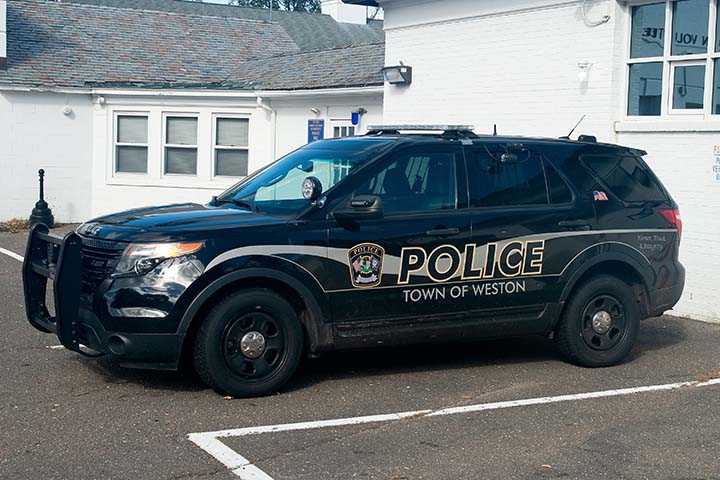Town Plans Major Public Safety Improvements, Part 2

October 22, 2018 — This is the second of a three-part report on preliminary plans presented by First Selectman Chris Spaulding to address long-needed improvements in Weston's public safety capabilities. This part is about the needs of the dispatch center, communication systems, and the police department. Part 1 contains an overview of the project and the portion involving the firehouse and EMS quarters. Part 3 reports where the funding would come from.
Dispatch & Communication Systems
Weston's dispatch operation, the nerve center of emergency response, is in rough shape.
Structural conditions are so poor that critical systems are exposed to the elements. Early this year, rain poured in through a long-leaky roof, right above vital electronics. Staff responded as best they could with blue tarps and duct tape. There was a real risk that the entire system would be crippled and fail, leaving residents who needed emergency assistance cut off from responders who could provide it. Somehow the system kept running, but it was a close call.
During last winter's nor'easters, when most of Weston lost power for several days, so did the Town complex, including the emergency operations center. When a generator failed, a backup was deployed, but even the placement of cooling fans couldn't relieve the heat in the server room. Temperatures reached 90 degrees, and the Town's servers crashed. Email and texts from residents to report downed trees and wires didn't reach the emergency operations center for days.
The project plan provides about $630 thousand to get the dispatch center into good working order. With luck, the final number comes in lower. But the town still needs modern, capable communications equipment, including handheld devices, which are expensive.
Dr. Spaulding reports that, right now, Weston's emergency responders use communication gear that is old, obsolete, unreliable, and susceptible to signal loss in various parts of town. Chief Ed Henion tells us that these units do not interoperate with equipment used by neighboring towns, and that this poses a threat to public safety in widespread emergencies. The handhelds are no longer manufactured, nor are they supported by their maker. When they break, staff must scramble to find parts and replacements on eBay.
At as much as $1.8 million, the estimated cost of replacing these systems represents the largest single component of the First Selectman's proposal. Up to another $400 thousand could be required to replace similar equipment used by Weston School District security personnel.
Police Headquarters
The most fundamental issue at police headquarters is that they are out of room, and have been for a long time. A growing volume of evidence must be stored, often for extended periods of time, in whatever space can be found, including open hallways. Dr. Spaulding and Chief Henion explain that this raises the specter of chain of custody disputes that could impair criminal prosecutions.
With so little room to spare, the police have improvised basic functions such as a makeshift interrogation room. The entire lower portion of the facility, including a water-stained ceiling where whole sections are missing, does not strike a visitor as particularly secure. Or safe. Detainees in other towns have been known to deliberately injure themselves on exposed surfaces, and sue.
The two holding cells at the station are of a vintage and design no longer used in most jurisdictions as they pose a risk that detainees could do themselves harm. This, again, is a source of potential liability, and monitoring the cell block to prevent it consumes manpower and resources that could be put to better use.
The project plan, while not nearly as ambitious for the police as previous versions, generally relieves the most immediate department needs and provides a bit more room by expanding into a portion of Town Hall. The estimated cost is almost $600 thousand, plus roughly $250 thousand to reconfigure Town Hall to make up for the space it loses and have it comply with the Americans with Disabilities Act.
The Money
Part 3 of this report deals with how the proposed project would be funded. The Town has ample reserves to do it, and one might think you can never have too much in savings. But for a municipal government, that may not be the case.
